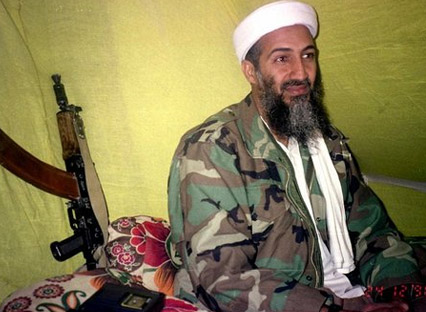Bin Laden death: who was the 'supergrass' who turned him in?
British Pakistani general named as the man who tipped off the CIA to Osama Bin Laden's secret location

A free daily email with the biggest news stories of the day – and the best features from TheWeek.com
You are now subscribed
Your newsletter sign-up was successful
Claims that Brigadier Usman Khalid, a former Pakistani intelligence officer and British pensioner, was the man who tipped off the CIA and led to the killing of Osama bin Laden have been strongly denied by his family.
Who is Usman Khalid?
Brigadier Khalid claimed asylum in Britain in 1979 after ending a 25-year military career in the Pakistani army. He resigned in protest at the execution of Zulfiqar Ali Bhutto, the former prime minister and father of Benazir Bhutto. His family said the cricket-loving pensioner died of cancer last year aged 79.
The Week
Escape your echo chamber. Get the facts behind the news, plus analysis from multiple perspectives.

Sign up for The Week's Free Newsletters
From our morning news briefing to a weekly Good News Newsletter, get the best of The Week delivered directly to your inbox.
From our morning news briefing to a weekly Good News Newsletter, get the best of The Week delivered directly to your inbox.
Where did the accusation come from?
The claim was made by Pakistan-based journalist Amir Mir in the News International. Citing military sources, he claims that Brigadier Khalid is the man Pulitzer Prize-winning journalist Seymour Hersh describes in his recent article about the raid where bin Laden was shot dead.
In the highly contested report, Hersh alleges that the White House lied about how Bid Laden was tracked down. He claims he was being held prisoner by the Pakistani intelligence agency and that a senior officer revealed bin Laden's location in exchange for a large amount of the $25m bounty offered by the US. His most shocking claim is that the US raid on the compound in Abbottabad was not a daring attack, but a carefully orchestrated execution following a deal with the Pakistani military.
Hersh's reputation as an investigative journalist has lent credence to the story. He exposed the My Lai massacre in Vietnam in 1969 and helped uncover the torture of Iraqi prisoners at Abu Ghraib in 2004. However, some have questioned whether Hersh may have "strayed from maverick investigator into outright conspiracy theorist," says the Daily Telegraph.
A free daily email with the biggest news stories of the day – and the best features from TheWeek.com
So, was Khalid the informant?
His family has strongly denied claims that he was behind the leak. "It simply doesn't make sense," his son Abid told the Daily Telegraph. "At the time that this was supposed to have happened, he was suffering from cancer and in and out of hospital." He claims his father had no contact with the CIA and knew nothing about bin Laden, "other than what he read in the newspapers, just like everyone else". Because Khalid was an outspoken critic of Pakistani politics, he was "an easy target," said his son.
Hersh has refused to comment on statement made by Khalid's family, but The Telegraph says it understands that he claims the source was not the same person identified by the Pakistani newspaper.
Meanwhile, Washington insists that nearly every line of Hersh's 10,000 word report is "inaccurate and baseless," maintaining that US intelligence agencies gathered the information about Bid Laden's whereabouts on their own, particularly by tailing a Kuwaiti courier known to be close to him. "I got a third of the way through and I stopped, because every sentence I was reading was wrong," wrote Michael Morrell, the then deputy CIA director wrote in the Wall Street Journal.
-
 6 exquisite homes with vast acreage
6 exquisite homes with vast acreageFeature Featuring an off-the-grid contemporary home in New Mexico and lakefront farmhouse in Massachusetts
-
 Film reviews: ‘Wuthering Heights,’ ‘Good Luck, Have Fun, Don’t Die,’ and ‘Sirat’
Film reviews: ‘Wuthering Heights,’ ‘Good Luck, Have Fun, Don’t Die,’ and ‘Sirat’Feature An inconvenient love torments a would-be couple, a gonzo time traveler seeks to save humanity from AI, and a father’s desperate search goes deeply sideways
-
 Political cartoons for February 16
Political cartoons for February 16Cartoons Monday’s political cartoons include President's Day, a valentine from the Epstein files, and more
-
 Epstein files topple law CEO, roil UK government
Epstein files topple law CEO, roil UK governmentSpeed Read Peter Mandelson, Britain’s former ambassador to the US, is caught up in the scandal
-
 Iran and US prepare to meet after skirmishes
Iran and US prepare to meet after skirmishesSpeed Read The incident comes amid heightened tensions in the Middle East
-
 Israel retrieves final hostage’s body from Gaza
Israel retrieves final hostage’s body from GazaSpeed Read The 24-year-old police officer was killed during the initial Hamas attack
-
 China’s Xi targets top general in growing purge
China’s Xi targets top general in growing purgeSpeed Read Zhang Youxia is being investigated over ‘grave violations’ of the law
-
 Panama and Canada are negotiating over a crucial copper mine
Panama and Canada are negotiating over a crucial copper mineIn the Spotlight Panama is set to make a final decision on the mine this summer
-
 Why Greenland’s natural resources are nearly impossible to mine
Why Greenland’s natural resources are nearly impossible to mineThe Explainer The country’s natural landscape makes the task extremely difficult
-
 Iran cuts internet as protests escalate
Iran cuts internet as protests escalateSpeed Reada Government buildings across the country have been set on fire
-
 US nabs ‘shadow’ tanker claimed by Russia
US nabs ‘shadow’ tanker claimed by RussiaSpeed Read The ship was one of two vessels seized by the US military